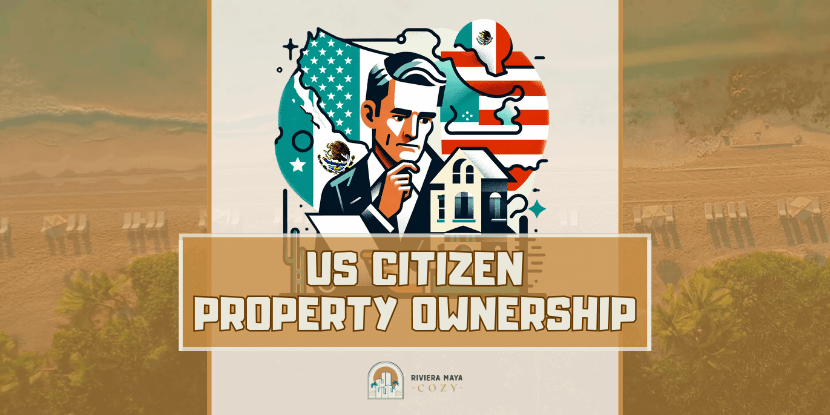Can a US Citizen Own Property in Mexico?

Owning a piece of paradise in Mexico, with its sun-kissed beaches, round-the-clock weather, and fun-loving culture, is a dream for many.
But can a U.S. citizen turn this dream into reality?
The short answer is yes, a US citizen can own property in Mexico but naturally, the process isn’t as straightforward as in the home country (unless you have dual citizenship).
Worry not, however, as in this article we will take a sandy stroll through the process, from buying the property to the potential pitfalls you need to watch out for.

Owning Property in Mexico as a US Citizen: Trust or Corporation?
First things first – you’ve found your perfect slice of Mexican heaven. Now, how do you go about sealing the deal?
As a U.S. citizen, you can’t simply come over and buy property outright. Instead, you have two primary options: the bank trust, known as a fideicomiso, or setting up a Mexican corporation.
Fideicomiso
The bank trust is the go-to option for most expats. In this setup, a Mexican bank holds the title in trust while you enjoy all the rights of ownership.
It’s like having your cake and letting someone else hold it – a sweet deal, considering it’s the most straightforward path for non-Mexican citizens.
The main reason for the establishment of a fideicomiso in Mexico is rooted in constitutional restrictions on foreign ownership of land, particularly in what is known as the “restricted zone.”
The restricted zone typically includes areas within 100 kilometers (about 62 miles) of international borders and 50 kilometers (about 31 miles) from coastlines. These restrictions are in place to protect Mexico’s sovereignty and prevent undue foreign influence on strategic border and coastal areas.
The process of setting up a fideicomiso is pretty simple and includes the following steps:
- Choosing the right bank – selecting the bank for your fideicomiso is a crucial step. While many major banks in Mexico offer these services, it’s wise to shop around. Consider factors like fees, reputation, and ease of communication. Some banks even specialize in catering to the needs of foreign buyers, providing services in English and streamlining the process.
- Initiating the Fideicomiso – once you’ve chosen your bank, the next step is initiating the fideicomiso. You’ll work with the bank and a notary public to draft the trust agreement, outlining the terms and conditions of the arrangement. This legal document ensures that your rights as the beneficial owner are protected and clearly defines the responsibilities of the trustee.
- Approval from the Ministry of Foreign Affairs – after drafting the fideicomiso agreement, it must be submitted to the Ministry of Foreign Affairs in Mexico for approval. This step adds an extra layer of protection for both parties involved. The approval process typically takes a few weeks, and once granted, you’re one step closer to unlocking the doors to your Mexican retreat.
- Funding the Fideicomiso – with the approval in hand, you’ll need to fund the fideicomiso. This involves transferring the necessary funds to the Mexican bank, covering not only the property purchase price but also the associated closing costs and fees. The bank will then finalize the trust and officially hold the title on your behalf.
- Enjoying the Benefits – with the fideicomiso in place, you, as the beneficial owner, have the right to use, lease, sell, or pass on the property to your heirs. It’s a secure and widely accepted mechanism that grants foreign buyers the confidence to invest in Mexico’s diverse real estate landscape.
Corporation
Alternatively, if you’re feeling a bit more business-savvy, you can establish a Mexican corporation to own the property. This involves more paperwork and legalities, but it can offer additional advantages, especially if you’re eyeing multiple investments.
Before going the corporational route, consider the following points:
- by forming a Mexican corporation, U.S. citizens can hold property titles directly, bypassing the need for a fideicomiso. This offers a more direct and hands-on approach to ownership. Moreover, a corporation can be a versatile tool for broader business endeavors, creating a platform for entrepreneurial ventures or serving as a vehicle for multiple property investments.
- the process of establishing a Mexican corporation involves legal and administrative steps. Engaging local legal experts well-versed in both U.S. and Mexican laws is crucial. These professionals guide buyers through the intricacies of incorporation, helping navigate registration, tax obligations, and compliance with local regulations.
- running a corporation comes with responsibilities, such as annual reporting and tax obligations. However, for those comfortable with a more involved approach to property ownership, the benefits can be substantial. The corporation route may offer more flexibility and control, allowing owners to adapt their structure based on changing circumstances.
Closing Costs
While closing costs in Mexico may not be as appealing as a beachfront sunset, they are an unavoidable part of the property-buying process. Typically ranging from 5% to 10% of the property’s value, these costs cover a variety of fees and taxes.
Expect to pay for notary fees, registration, and, of course, the services of a notary public. Don’t let the term scare you – a notary public in Mexico is different from the U.S., functioning more like a legal professional than a stamp-giver.
This step is crucial, as the notary ensures all the legal boxes are ticked, giving you peace of mind as you sip your margarita on the porch.
Tax Implications
As the sun dips below the horizon, let’s shed some light on taxes.
The Mexican tax system may differ from what you’re used to, but don’t let it scare you. During the property purchase, you’ll encounter the infamous acquisition tax. This one-time fee, around 2% to 4%, is based on the property’s assessed value.
After securing your tropical haven, you’ll enter the realm of annual property taxes. These taxes are usually lower than what you’d find in the U.S., making it a less bitter pill to swallow.
However, keep in mind that the rates can vary depending on the municipality where your property is located.
Potential Risks
While the beach breeze may have you in a state of euphoria, it’s essential to be aware of potential risks when buying property in Mexico.
One concern is ejido land, communal land owned by local communities. While it’s possible to purchase ejido land, it comes with a unique set of challenges and may require additional legal steps.
Another consideration is the stability of the Mexican peso. Exchange rate fluctuations can impact your property’s value and affect your overall investment. It’s a bit like riding the waves – exhilarating but unpredictable.
Additionally, it’s crucial to do your due diligence regarding the property’s title. Ensure it’s clear and free of any encumbrances that could cause issues during the property transfer. Engaging a reputable local lawyer who understands both U.S. and Mexican property laws can be your lifesaver in navigating these potential risks.
Can a US Citizen Own Property in Mexico? Conclusion
In the grand fiesta of life, owning property in Mexico as a U.S. citizen is not just a possibility but a reality many have embraced.
Whether you decide to finally claim the Mexican property with the simplicity of a bank trust or the strategic approach of a Mexican corporation, the process is within reach for those willing to dive into the turquoise waters of Mexican real estate.
Closing costs may give you a momentary pause, but they are the gatekeepers to your dream abode. Embrace them with the same enthusiasm you’d reserve for a mariachi band at a beachfront wedding.
Taxes, while an inevitable part of the journey, shouldn’t cast a shadow over your Mexican sunsets. Understand them, and plan accordingly.
As for potential risks, every adventure has its challenges. With careful research, local expertise, and a dash of adventurous spirit, you will be just fine.
At RivieraMayaCozy.com, our team helps people like you get into the Riviera Maya real estate market. If you’d like us to guide you through the process, get in touch using the contact form below.
About The Author
Oswaldo Ortega
Hi there! I'm Oswaldo Ortega González, a 34-year-old real estate agent based in the stunning Riviera Maya. Originally hailing from Mexico City, I've immersed myself in the beauty of this coastal paradise for the past 5 years. With an equal 5-year span in the real estate sector, my journey here has been nothing short of remarkable. Before diving into the world of properties, I worked in retail onboard cruise ships, which was quite the adventure. But my real estate calling was ignited by a deep desire to help people discover the immense potential in real estate investments. I've always believed in the power of real estate to pave the way to financial freedom, and I'm excited to guide others on this path. When I'm not busy exploring the world of properties, you can often find me engrossed in a good book or working up a sweat through exercise. And when it comes to satisfying my taste buds, nothing beats the tantalizing flavors of Tacos de pastor. The driving force behind everything I do is the simple yet powerful desire to create unique and unforgettable experiences with my family and loved ones. It's what motivates me each day as I help my clients make their real estate dreams a reality in the breathtaking Riviera Maya.

